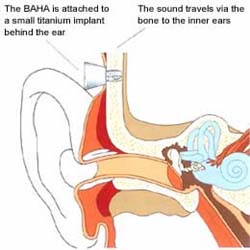Bone-Anchored Hearing Helpful For Kids With Single-Sided Deafness
 A latest research has suggested that bone-anchored hearing aids help children having deafness in one ear.
A latest research has suggested that bone-anchored hearing aids help children having deafness in one ear.
The results of the research appeared in the February issue of Archives of Otolaryngology -- Head & Neck Surgery, one of the JAMA/Archives journals.
Single-sided hearing loss, which is also called profound unilateral sensorineural hearing loss, is often linked with poor performance during schooldays, learning problems and behavioural troubles, often attributed to the kid's incapability to perform properly in loud conditions.
Traditional, external hearing helps may amend knowledge as well as performance, but compliance is normally low, particularly outside the schoolroom.
Study authors said, "Thus, treatment options for profound unilateral sensorineural hearing loss in children are limited, thereby creating a source of frustration and a need for alternative treatments".
Lisa Christensen, Au. D., of Arkansas Children''s Hospital, Little Rock, and colleagues stated, "In an effort to provide a durable treatment option, the bone-anchored hearing aid has been explored for use in children with single-sided deafness."
The study scientists examined the charts of 23 kids and teenagers (age range 6 to 19, average age 12.6) with one-sided hearing inability who had bone-anchored hearing aids more than a three-year period.
Each surgical procedure was done in two phases with at least 6-months in between and patients were equipped with one of two kinds of bone-anchored hearing aid processors two weeks after the second phase.
Hearing examinations were carried out and each patient and a parent or guardian were said to fill a questionnaire regarding listening troubles before and after the fitting.
Scores on both hearing examinations and questionnaires bettered in a significant manner following surgical procedure.
Both kids and teens showed progresses in their hearing abilities.
The authors said, "In conclusion, the treatment of children and teenagers with profound unilateral sensorineural hearing loss has been frustrating owing to the known disability associated with this condition and to a lack of acceptance and benefit of traditional amplification techniques."
"These findings are helpful in counseling children 5 years and older and their families regarding treatment options for single-sided deafness," they conclude. (With Input from Agencies)